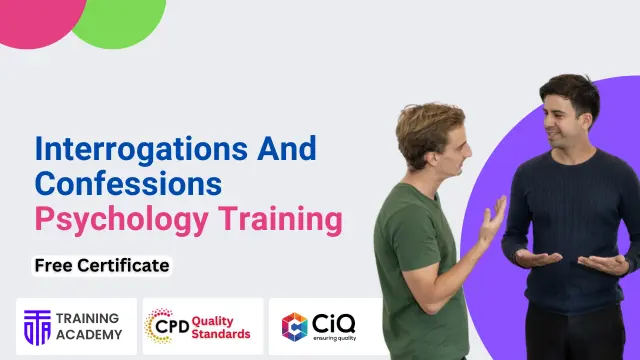
Interrogations And Confessions Psychology Training
CPD Accredited ! Free Certification | FREE Retake Exam | Lifetime Access | No Hidden Fees.
Online Training Academy
Summary
- Digital certificate - Free
- Reed Courses Certificate of Completion - Free
- Tutor is available to students
Add to basket or enquire
Overview
Are you fascinated by the intricacies of human behavior under interrogation? Do you want to master the psychology behind confessions and understand the legal implications? Our comprehensive training course is designed to equip you with the knowledge and skills needed to navigate this complex field with confidence.
Key Features:
- CPD Certified
- Free Certificate from Reed
- CIQ Approved
- Developed by Specialist
- Lifetime Access
Certificates
Digital certificate
Digital certificate - Included
Reed Courses Certificate of Completion
Digital certificate - Included
Will be downloadable when all lectures have been completed.
CPD
Curriculum
Course media
Description
In this course, learners explore the psychology behind interrogations and confessions within the context of British law. They study how drugs and alcohol affect the reliability of testimonies, and learn to assess the psychological factors that can lead to false confessions. The course covers oppressive police interviewing tactics, aiming to identify methods that may lead to unfair outcomes. Learners also delve into research conducted by the Royal Commission on the risks faced by individuals in police custody.
They examine various theories that explain why suspects confess, gaining insights into the psychological and legal aspects of confession in the British legal system. Overall, the course equips learners with a deep understanding of interrogation techniques, the factors influencing confessions, and the implications for justice and fairness in law enforcement practices.
Course Curriculum
- Module 01: Interrogation in Britain
- Module 02: The English Law on Confessions
- Module 03: The Effects of Drugs and Alcohol upon the Reliability of Testimony Interrogation
- Module 04: The Psychological Assessment of False Confession
- Module 05: Identifying ‘Oppressive’ Police Interviewing Tactics in Britain
- Module 06: The Royal Commission Research Persons at Risk amid Police Custody
- Module 07: Theories of Reason of Confession by Suspects
Learning Outcomes:
- Understand the legal framework of interrogation in British law enforcement.
- Analyze the impact of drugs and alcohol on witness testimony reliability.
- Identify psychological indicators of false confessions during police questioning.
- Evaluate the ethical implications of police interviewing tactics in Britain.
- Assess the risks faced by individuals in police custody scenarios.
- Explore theoretical perspectives on suspects' motivations for confessing.
Who is this course for?
- Law enforcement personnel seeking advanced interrogation psychology knowledge.
- Criminal justice professionals involved in witness testimony assessment.
- Psychologists and therapists interested in forensic psychology applications.
- Legal professionals specializing in criminal law and defence strategies.
- Researchers focusing on police practices and suspect confession behaviour.
Career path
- Police Detective specializing in interrogation techniques.
- Forensic Psychologist working with law enforcement agencies.
- Criminal Lawyer specializing in confessions and witness testimony.
- Academic Researcher studying police interrogation methods.
- Legal Consultant advising on interrogation policies.
- Criminologist analyzing patterns in confession behaviours.
Questions and answers
Currently there are no Q&As for this course. Be the first to ask a question.
Reviews
Currently there are no reviews for this course. Be the first to leave a review.
Legal information
This course is advertised on reed.co.uk by the Course Provider, whose terms and conditions apply. Purchases are made directly from the Course Provider, and as such, content and materials are supplied by the Course Provider directly. Reed is acting as agent and not reseller in relation to this course. Reed's only responsibility is to facilitate your payment for the course. It is your responsibility to review and agree to the Course Provider's terms and conditions and satisfy yourself as to the suitability of the course you intend to purchase. Reed will not have any responsibility for the content of the course and/or associated materials.


